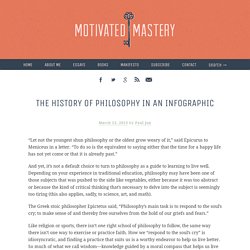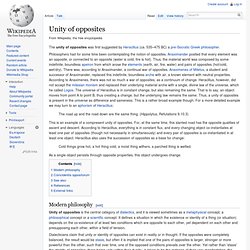

The relentless honesty of Ludwig Wittgenstein. A new series from the TLS, appraising the works and legacies of the great thinkers and philosophers If you ask philosophers – those in the English speaking analytic tradition anyway – who is the most important philosopher of the twentieth century, they will most likely name Ludwig Wittgenstein.

But the chances are that if you ask them exactly why he was so important, they will be unable to tell you. Moreover, in their own philosophical practice it will be rare, certainly these days, that they mention him or his work. Indeed, they may very fluently introduce positions, against which Wittgenstein launched powerful arguments: the very arguments which, by general agreement, make him such an important philosopher. Contemporary philosophers don’t argue with Wittgenstein. Beauty is Not (Entirely) in the Eye of the Beholder. Beauty is Not (Entirely) in the Eye of the Beholder by Dwight Furrow In philosophy the most important development in the last 300 years has been the idea that what can be intelligibly said about reality is constructed out of our subjective responses, suitably constrained by social norms and intersubjective communication.

This is the essence of Immanuel Kant's so-called Copernican Revolution in philosophy which converted us from naïve realists who took reality at face value to sophisticated anti-realists constructing reality via the structures of consciousness and language. Kant's argument is sound but preposterous. Glogin?URI= Academic Drivel Report. I don’t know if there is a statute of limitations on confessing one’s sins, but it has been six years since I did the deed and I’m now coming clean.

Six years ago I submitted a paper for a panel, “On the Absence of Absences” that was to be part of an academic conference later that year—in August 2010. Then, and now, I had no idea what the phrase “absence of absences” meant. The description provided by the panel organizers, printed below, did not help. The summary, or abstract of the proposed paper—was pure gibberish, as you can see below. I tried, as best I could within the limits of my own vocabulary, to write something that had many big words but which made no sense whatsoever. I am not the first academic to engage in this kind of hoax. Sokal’s ruse was more ambitious than mine. My paper had no point at all. Experiencing the moment.
Please Subscribe to 3QD If you would like to make a one time donation in any amount, please do so by clicking the "Pay Now" button below.

You may use any credit or debit card and do NOT need to join Paypal. The editors of 3QD put in hundreds of hours of effort each month into finding the daily links and poem, putting out the Monday Magazine, administering the Quark Prizes, arranging the DAG-3QD Peace and Justice Symposia, and doing the massive amount of behind-the-scenes work which goes into running the site. If you value what we do, please help us to pay our editors very modest salaries for their time and cover our other costs by subscribing above.
Graphing the history of philosophy. A close up of ancient and medieval philosophy ending at Descartes and Leibniz If you are interested in this data set you might like my latest post where I use it to make book recommendations.

This one came about because I was searching for a data set on horror films (don’t ask) and ended up with one describing the links between philosophers. To cut a long story very short I’ve extracted the information in the influenced by section for every philosopher on Wikipedia and used it to construct a network which I’ve then visualised using gephi It’s an easy process to repeat. It could be done for any area within Wikipedia where the information forms a network.
First I’ll show why I think it’s worked as a visualisation. The History of Philosophy in an Infographic. “Let not the youngest shun philosophy or the oldest grow weary of it,” said Epicurus to Meniceus in a letter.

“To do so is the equivalent to saying either that the time for a happy life has not yet come or that it is already past.” And yet, it’s not a default choice to turn to philosophy as a guide to learning to live well. Depending on your experience in traditional education, philosophy may have been one of those subjects that was pushed to the side like vegetables, either because it was too abstract or because the kind of critical thinking that’s necessary to delve into the subject is seemingly too tiring (this also applies, sadly, to science, art, and math). Philographics — Genis Carreras. Philosophy Timeline. PhilPapers: Online Research in Philosophy.
Derrida Full Documentary - Part 1. Interactive Processes. Alan Watts - What is reality. The Jean-Paul Sartre Internet Archive. Wittgenstein’s Ethics and the Value of the Mystical « Douglas Duhaime Although Ludwig Wittgenstein (1889-1951) famously declared that “ethics cannot be put into words,” ethical issues continue to pose perennial problems for philosophy, and Wittgenstein’s writings on ethics continue to earn philosophy’s interest and accolades (2005 p.183).

The Realm of Existentialism, Minds of Existentialism, Existentialism, Phenomenology, Existential Psychology, Quotes by Philosophers, Existential. Candyland and the Nature of the Absurd. Candyland and the Nature of the Absurd Sartre and Camus told everyone that their falling out was over politics, but really it was mostly over Sartre evoking "radical freedom" one too many times at game night Permanent Link to this Comic:

Kierkegaard in 90 Minutes. Dasein. 60-Second Adventures in Thought (combined) Think. The Cave: An Adaptation of Plato's Allegory in Clay. Verene - Secular Gospel. What is Time?
Religion. Unity of opposites. The unity of opposites was first suggested by Heraclitus (ca. 535–475 BC) a pre-Socratic Greek philosopher.

The road up and the road down are the same thing. (Hippolytus, Refutations 9.10.3) This is an example of a compresent unity of opposites. For, at the same time, this slanted road has the opposite qualities of ascent and descent. According to Heraclitus, everything is in constant flux, and every changing object co-instantiates at least one pair of opposites (though not necessarily in simultaneously) and every pair of opposites is co-instantiated in at least one object. Cold things grow hot, a hot thing cold, a moist thing withers, a parched thing is wetted. As a single object persists through opposite properties, this object undergoes change. Modern philosophy[edit] Unity of opposites is the central category of dialectics, and it is viewed sometimes as a metaphysical concept, a philosophical concept or a scientific concept.
Coincidentia oppositorum[edit] See also[edit] References[edit] Information Philosopher - Introduction. Introduction The Information Philosopher has established that quantum mechanics and thermodynamics play a central role in the creation of all things.

This finding has enormous implications for philosophy and metaphysics. The Hermeneutic Circle. The concept of the hermeneutic circle is a difficult concept to grasp. Why not Stoicism? By Massimo Pigliucci Stoicism has been in the back of my mind since I was very young, initially for the obviously parochial reason that it was the prevalent philosophy among the ancient Romans, i.e., part of my broadly construed cultural heritage.
(Then again it is for the same reason that Buddhism is very popular in India, Confucianism in China, and Shinto in Japan.) Lately, however, Stoicism has slowly moved to the forefront of my cognitive field of view, for a number of reasons. To begin with, I’ve been interested in philosophical counseling [1], to the point of having taken the American Philosophical Practice Association course [2], and having set up what is turning out to be a surprisingly successful and enjoyable practice [3]. The more I see clients, the more I gravitate toward ancient Greek philosophy, and particularly Stoicism (with a sprinkling of virtue ethics and Epicureanism) as my preferred approach to “therapy for the sane.”
What about metaphysics?